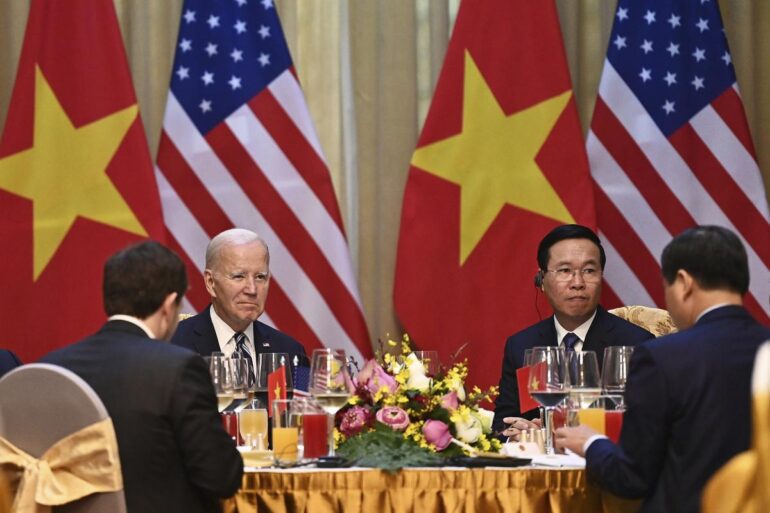TL;DR:
- US and Vietnam announce multibillion-dollar business deals and partnerships in AI and tech.
- Key sectors emphasized include cloud computing, semiconductors, and AI.
- President Biden underscores the significance of strengthening the semiconductor supply chain.
- Major tech companies like Google, Intel, Boeing, Amkor, Microsoft, and Nvidia are actively involved.
- Amkor plans to establish a manufacturing facility in Vietnam dedicated to AI chip assembly and testing.
- Vietnam is one of the world’s fastest-growing economies, ranking 34th globally with a GDP of $450 billion.
- The agreement elevates the US’s position in Vietnam’s bilateral hierarchy.
- This development is part of the global race in AI, particularly between the US and China.
Main AI News:
In a groundbreaking display of international collaboration, the United States and Vietnam have cemented business agreements and strategic partnerships valued at billions of dollars. These landmark developments in the world of technology were unveiled during a joint press conference held on September 11, setting the stage for a new era of cooperation.
President Joe Biden emphasized the significance of this move, characterizing it as an official “upgrading” of the relationship between the two nations. He underscored the pivotal role of critical sectors such as cloud computing, semiconductors, and artificial intelligence (AI) in this transformation. President Biden stated, “We’re deepening our cooperation on critical and emerging technologies, particularly around building a more resilient semiconductor supply chain.”
He further articulated his expectations for this economic partnership, envisioning it as a catalyst for increased trade and investment between the two nations. However, it’s crucial to note that President Biden clarified that this initiative is not driven by a desire to contain China but rather to establish a stable and robust foundation within the region.
The event witnessed the presence of influential figures from major corporations in the tech space, including Google, Intel, Boeing, Amkor, Microsoft, and Nvidia. The significance of these players cannot be overstated, as their involvement underscores the magnitude of the agreements reached.
In a complementary move, Boeing and Amkor secured additional deals that will shape the tech landscape. Amkor, in particular, unveiled plans to establish a new manufacturing facility near Hanoi, the capital of Vietnam. Starting this October, this facility will be dedicated to the assembly, packaging, and testing of cutting-edge AI chips—a testament to the growing prominence of Vietnam in the tech industry.
According to data from Acclime, a prominent corporate services provider in Asia, Vietnam has emerged as one of the world’s fastest-growing economies, currently ranking 34th globally with a staggering gross domestic product of $450 billion. Notably, Vietnam’s shift from centralized economic control to a more open economy has enabled the United States to become one of its primary export markets.
This AI-focused agreement has not only deepened economic ties but also elevated the United States to a more prominent position in Vietnam’s bilateral hierarchy. In the past, this standing was predominantly occupied by China, Russia, India, and South Korea. The historically complex relationship between the United States and Vietnam, marked by war and geopolitical considerations, has now entered a new phase of cooperation and mutual growth.
These developments unfold against the backdrop of a global race to harness and deploy advanced AI systems, with a particular focus on the rivalry between the United States and China. In October 2022, the Biden administration implemented an export ban on the latest and most potent semiconductor chips destined for China, signaling a tightening of restrictions. Meanwhile, China has implemented its own AI regulations, resulting in the release of over 70 AI models boasting over a billion parameters.
Conclusion:
The US-Vietnam agreements mark a pivotal moment in the tech industry, fostering deeper cooperation in critical sectors and strengthening supply chains. This collaboration reflects Vietnam’s rising economic prominence and the US’s commitment to fortifying its presence in the region. As the tech landscape evolves, these partnerships are poised to have a transformative impact on the market, fueling innovation and growth.

